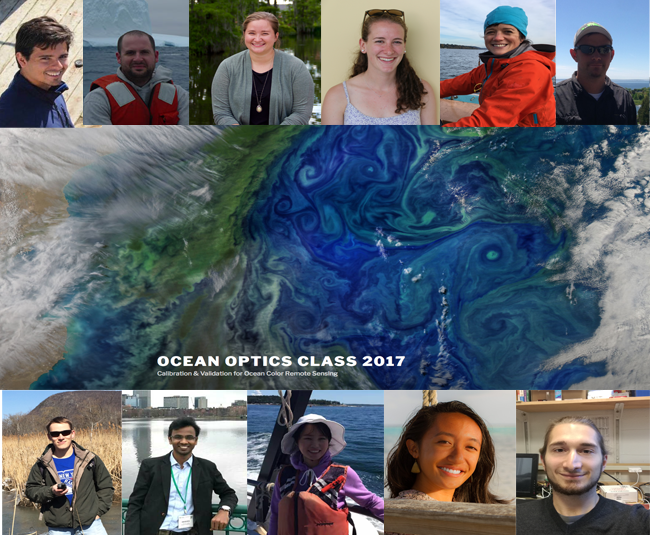OCB-sponsored participants of Univ. Maine Calibration and Validation of Ocean Color Remote Sensing summer course May 2017.
Course resources, including lecture videos, are available online.
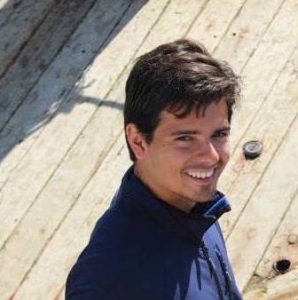 Lionel Arteaga is currently a Postdoctoral Research Associate in Jorge Samiento’s group at Princeton University. He initially studied Biology at Universidad Simon Bolivar, Venezuela, where he analyzed the upwelling systems in the northern coast of Venezuela using satellite data. In 2009, Lionel moved to Germany to complete his Master in Science and PhD in Oceanography at the University of Kiel, under the supervision of Andreas Oschlies, in the Marine Biogeochemistry Modeling group. His PhD dissertation was titled Combining satellite and model analyses to describe phytoplankton growth.
Lionel Arteaga is currently a Postdoctoral Research Associate in Jorge Samiento’s group at Princeton University. He initially studied Biology at Universidad Simon Bolivar, Venezuela, where he analyzed the upwelling systems in the northern coast of Venezuela using satellite data. In 2009, Lionel moved to Germany to complete his Master in Science and PhD in Oceanography at the University of Kiel, under the supervision of Andreas Oschlies, in the Marine Biogeochemistry Modeling group. His PhD dissertation was titled Combining satellite and model analyses to describe phytoplankton growth.
“The 2017 class on Calibration and Validation of Ocean Color Remote Sensing at the DMC was one of the best learning experiences of my career. I was highly impressed with the quality of the lectures, lab practices, and the dedication of all the instructors. I highly recommend this class to anyone working with ocean color and/or remote sensing information.”
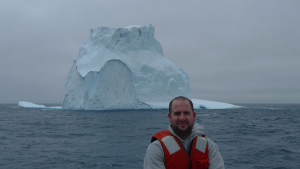 Mike Brown is a PhD candidate in the Department of Marine and Coastal Sciences at Rutgers University, advised by Dr. Oscar Schofield. His dissertation is focused on phytoplankton ecology along the Western Antarctic Peninsula, with a specific focus on diatoms on cryptophytes, the dominant algal taxa in the region. With regard to optical oceanography and ocean color remote sensing, he is particularly interested in developing and using methods to estimate phytoplankton functional types.
Mike Brown is a PhD candidate in the Department of Marine and Coastal Sciences at Rutgers University, advised by Dr. Oscar Schofield. His dissertation is focused on phytoplankton ecology along the Western Antarctic Peninsula, with a specific focus on diatoms on cryptophytes, the dominant algal taxa in the region. With regard to optical oceanography and ocean color remote sensing, he is particularly interested in developing and using methods to estimate phytoplankton functional types.
“Thank you to the OCB program for supporting my travel to the 2017 Ocean Optics Course at the University of Maine’s Darling Marine Center. Thank you as well to all the course instructors for a fantastic experience. With informative lectures on the fundamentals of ocean optics, and practical exercises in the laboratory and field, I left the course with the skills needed for my current dissertation work and future research in optical oceanography. The Darling Marine Center is a wonderful facility, and I had a great time meeting and working with my fellow classmates.”
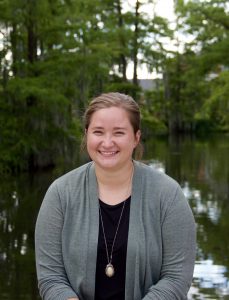 Andrea Jaegge is a 2nd year PhD student at the University of Louisiana at Lafayette working in Dr. Beth Stauffer’s phytoplankton ecology research lab. Her research focuses on quantifying environmental controls on phytoplankton communities in Louisiana’s coastal estuaries. She is also interested in examining the presence of toxin-producing species and assessing their possible ecosystem impacts.
Andrea Jaegge is a 2nd year PhD student at the University of Louisiana at Lafayette working in Dr. Beth Stauffer’s phytoplankton ecology research lab. Her research focuses on quantifying environmental controls on phytoplankton communities in Louisiana’s coastal estuaries. She is also interested in examining the presence of toxin-producing species and assessing their possible ecosystem impacts.
“The ocean optics course was a fantastic learning experience! Working with the world’s leading optical oceanographers allowed me to learn new skills that will be incredibly valuable to my doctoral research. This opportunity also allowed me to connect with many other young scientists working in this field. Thank you UMaine and NASA for sponsoring this incredible course!”
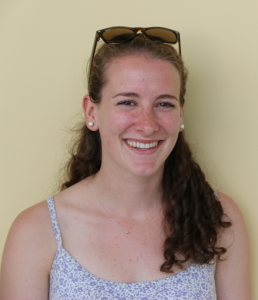 Sasha Kramer is a second-year PhD student in Marine Science at UC Santa Barbara working with Dr. Dave Siegel. Her work focuses on evaluating and comparing in situ methods for determining phytoplankton community structure on global scales, including optical measurements and phytoplankton pigments. Before attending UCSB, she received a degree in Earth and Oceanographic Science from Bowdoin College in Maine.
Sasha Kramer is a second-year PhD student in Marine Science at UC Santa Barbara working with Dr. Dave Siegel. Her work focuses on evaluating and comparing in situ methods for determining phytoplankton community structure on global scales, including optical measurements and phytoplankton pigments. Before attending UCSB, she received a degree in Earth and Oceanographic Science from Bowdoin College in Maine.
“I had been hearing about the ocean optics class for years, but actually being a student at the course surpassed all of my expectations. I feel so lucky to have had the opportunity to attend the course and vastly improve my skills across the board. I learned an incredible amount about in situ and remote sensing methods, from data collection and analysis to calibration and validation of instrumentation and so much more. One of my favorite parts of the class was our final project, where we were able to design and carry out independent projects using the skills we had gained. I am so grateful to all of our instructors for their non-stop hard work and dedication to the students throughout the class! Thank you!”
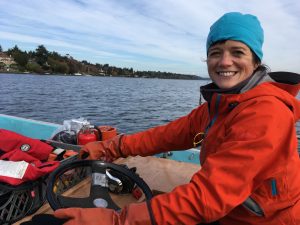 Catherine Kuhn is a third-year PhD student at the University of Washington in the School of Forest and Environmental Sciences. Her expertise is in inland water carbon cycling, satellite remote sensing and geospatial big data analysis. She graduated with her MESc from Yale University School of Forestry & Environmental Studies where she quantified carbon dioxide and methane emissions from headwater streams in Wyoming’s Bighorn Mountain range. For her PhD, she is using optical remote sensing and high-resolution underway field surveys to evaluate carbon cycling dynamics in large river systems under the direction of Dr. David Butman.
Catherine Kuhn is a third-year PhD student at the University of Washington in the School of Forest and Environmental Sciences. Her expertise is in inland water carbon cycling, satellite remote sensing and geospatial big data analysis. She graduated with her MESc from Yale University School of Forestry & Environmental Studies where she quantified carbon dioxide and methane emissions from headwater streams in Wyoming’s Bighorn Mountain range. For her PhD, she is using optical remote sensing and high-resolution underway field surveys to evaluate carbon cycling dynamics in large river systems under the direction of Dr. David Butman.
“The Ocean Optics course experience exposed me to a new level of rigor and expertise in ocean color validation and calibration. The lectures, hands-on practice in the labs and cruise, and the independent projects gave us a solid grounding in the core theoretical concepts underlying the physics of light as well as practical methodological tips for data collection, validation, and analysis. In addition, we also gained an invaluable network of peers from all over the world who bring their own expertise and experience to the course, further enriching the experience. Thank you so much, NASA and the University of Maine, for making this experience possible!”
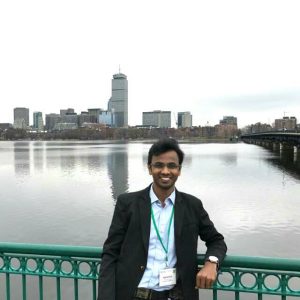 Abhishek Kumar is a second-year PhD Student (Department of Geography, University of Georgia, Athens-GA) with Dr. Deepak R. Mishra. Abhishek’s research interests are remote sensing of water quality parameters in coastal lagoons, estuaries, open ocean, and inland lakes/water bodies using multi-platform satellite sensor derived data. His past work includes remote monitoring of suspended sediment in a tropical coastal lagoon (Chilika, India: Asia’s largest brackish water lagoon) using MODIS/Terra and differential impact of anniversary severe cyclones on the water quality of a tropical coastal lagoon. Presently, Abhishek is developing a multi-sensor tool for monitoring inherent optical properties of water in a tropical coastal lagoon using in-situ and satellite data.
Abhishek Kumar is a second-year PhD Student (Department of Geography, University of Georgia, Athens-GA) with Dr. Deepak R. Mishra. Abhishek’s research interests are remote sensing of water quality parameters in coastal lagoons, estuaries, open ocean, and inland lakes/water bodies using multi-platform satellite sensor derived data. His past work includes remote monitoring of suspended sediment in a tropical coastal lagoon (Chilika, India: Asia’s largest brackish water lagoon) using MODIS/Terra and differential impact of anniversary severe cyclones on the water quality of a tropical coastal lagoon. Presently, Abhishek is developing a multi-sensor tool for monitoring inherent optical properties of water in a tropical coastal lagoon using in-situ and satellite data.
“The Ocean Optics course is the greatest learning program I have attended so far. Before the start of the class, I had much less knowledge about the science behind the remote sensing of water bodies. This program helped to build fundamentals and clarify the concepts in ocean remote sensing. Students are exposed to hands-on experiment every day in the lab and field, which helps a lot to learn in true environment and implement the skills learned during lecture session. The close proximity to Damariscotta River Estuary makes Darling Marine Center very useful for water quality research. Training facilities and great inspiring and motivational instructors are the heart of this program, which produced great researchers from this class in past and I believe many more great researchers will emerge in future as well. Overall, I would say it was a dream journey to attend this class, which I will always remember and the learning experiences need to practice lifelong!!!”
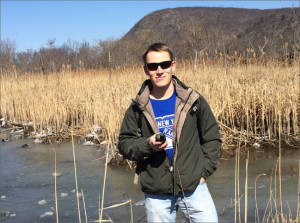 Brian Lamb is a third-year Ph.D. student in the Department of Earth and Environmental Sciences at the City University of New York. He is advised by Maria Tzortziou and Kyle McDonald. His research centers on studying ecological processes in tidal wetlands, with a particular focus on using radar remote sensing to study wetland vegetation phenology and wetland hydrology. He is beginning to broaden his remote sensing horizons to include aquatic remote sensing, and is interested in using satellite observations of CDOM to better understand the exchanges of dissolved carbon between tidal wetlands and estuaries.
Brian Lamb is a third-year Ph.D. student in the Department of Earth and Environmental Sciences at the City University of New York. He is advised by Maria Tzortziou and Kyle McDonald. His research centers on studying ecological processes in tidal wetlands, with a particular focus on using radar remote sensing to study wetland vegetation phenology and wetland hydrology. He is beginning to broaden his remote sensing horizons to include aquatic remote sensing, and is interested in using satellite observations of CDOM to better understand the exchanges of dissolved carbon between tidal wetlands and estuaries.
“The Ocean Optics course was an unbelievable learning experience. Coming from a terrestrial remote sensing background, this course highlighted how comparatively challenging ocean/aquatic remote sensing is in a technical sense. Especially when considering the lower signal to noise ratios for aquatic targets (water) and the need for more precise atmospheric corrections. For me, the highlight of the class was learning to use SeaDAS, and being trained by the very people that helped develop the software. I’d like to thank NASA and the wonderful instructors for this opportunity.”
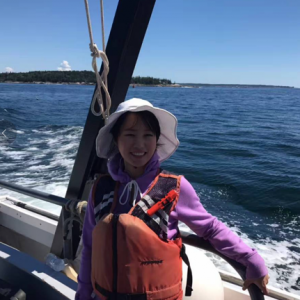 Bingqing Liu is a third-year PhD student in the Department of Oceanography and Coastal Sciences at Louisiana State University, advised by Eurico J. D’Sa. Her work focuses on using in-situ measurements and ocean color remote sensing in coastal and open ocean waters, including the Barataria Bay and Gulf of Mexico, US. Her research interests include inversion model for IOPs and developing algorithms for water quality parameters in order to study the interaction between physical process and optical parameters in water bodies.
Bingqing Liu is a third-year PhD student in the Department of Oceanography and Coastal Sciences at Louisiana State University, advised by Eurico J. D’Sa. Her work focuses on using in-situ measurements and ocean color remote sensing in coastal and open ocean waters, including the Barataria Bay and Gulf of Mexico, US. Her research interests include inversion model for IOPs and developing algorithms for water quality parameters in order to study the interaction between physical process and optical parameters in water bodies.
“Ocean Optics 2017, I felt like it was the fastest month with longest nights of my life. I gained great knowledge in the study of ocean optics and made amazing friends across the globe in science. I can’t thank OCB and NASA enough for that I could spend four weeks learning and discussing science with some of the greatest minds of Optical Oceanography. I really enjoyed the organized lectures, lab and field trip of the course, which provided very useful background knowledge about ocean optics including outstanding research work, instrument calibration, sample collection and data processing. Thanks so much Emmanuel Boss and Collin Roesler (and many others) for leading and inspiring the next-generation ocean optics scientists. They are really knowledgeable and excellent instructors and helped me trouble-shoot difficult problems in data processing, field trip design and scientific ideas. I appreciate all the comments and encouragement they gave me, which opened my eyes and stimulated new ideas for my research. What’s more, the case study of Ethics in Science taught me how to share and cooperate in ways that will benefit me a life-long.”
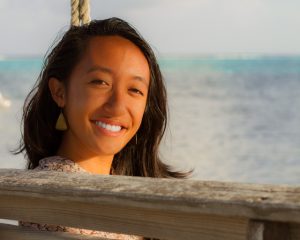 Kelly Luis is a second-year PhD student in the School for the Environment at University of Massachusetts-Boston, advised by Zhongping Lee. She currently works on ocean color remote sensing projects involving coastal water quality and coral reefs. Prior to joining Professor Lee’s lab, she graduated with a BA in Environmental Science from Columbia University. After her undergraduate studies, Kelly spent a year working on remote sensing and carbonate chemistry projects at Woods Hole Oceanographic Institution as a research associate.
Kelly Luis is a second-year PhD student in the School for the Environment at University of Massachusetts-Boston, advised by Zhongping Lee. She currently works on ocean color remote sensing projects involving coastal water quality and coral reefs. Prior to joining Professor Lee’s lab, she graduated with a BA in Environmental Science from Columbia University. After her undergraduate studies, Kelly spent a year working on remote sensing and carbonate chemistry projects at Woods Hole Oceanographic Institution as a research associate.
“I’m deeply appreciative for the calibration and validation ocean color remote sensing instructors and students. As an early graduate student, I was drawn to this class because I needed a better understanding of ocean optics fundamentals. This class exceeded my expectations. The instructors genuinely cared about us understanding the materials and they gave us the resources and support necessary to carry back the materials to our home institutions. In addition, their emphasis on building a collaborative and supportive scientific community made the class worthwhile. Lastly, the students have become my collaborators and life-long friends. Thank you, OCB, for supporting my attendance and my growth as a young scientist.”
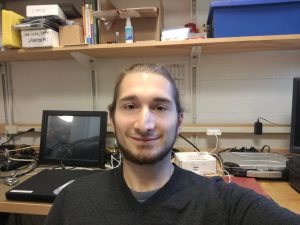
Ryan O’Shea is a third-year PhD student within the Woods Hole Oceanographic Institution and Massachusetts Institute of Technology Joint Program. His research focuses on developing novel optical instrumentation and data processing techniques for the study of water quality parameters in highly dynamic environments. His current research is on characterizing and developing drone deployable hyperspectral systems for mapping phytoplankton in regions that require high spectral, spatial, and temporal resolution data (i.e. coastal regions).
“The Calibration and Validation of Ocean Color Remote Sensing course at the University of Maine was an intense and rewarding experience. Through the seminars in this course I received very broad and rapid training in the field of ocean optics, learning the fundamentals of multiple different disciplines. As an engineer designing new optical instruments, learning what optical instruments were available and how scientists use the currently available instruments in their research was an invaluable experience. The instructors and TA’s provided feedback during our presentations that enabled us to interpret our data more accurately and develop more robust experiments. Their insight and manner of thinking enabled me to approach not only ocean optics problems, but scientific experiments and data in general, more critically. Thank you to OCB, NASA, and all of the instructors at this course for a very fruitful experience!”
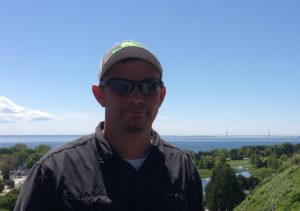 Mike Sayers is a third-year PhD student at Michigan Tech University and a research scientist at the Michigan Tech Research Institute (MTRI), where his research has been focused on the use of bio-optical remote sensing methods to assess water quality changes in the Laurentian Great Lakes. Prior to his position at Michigan Tech, he received his BS and MS in remote sensing from Central Michigan University. His current interest is in the development and application of airborne and satellite hyperspectral inversion models for assessing primary production dynamics, harmful algal bloom occurrences, and benthic cover change.
Mike Sayers is a third-year PhD student at Michigan Tech University and a research scientist at the Michigan Tech Research Institute (MTRI), where his research has been focused on the use of bio-optical remote sensing methods to assess water quality changes in the Laurentian Great Lakes. Prior to his position at Michigan Tech, he received his BS and MS in remote sensing from Central Michigan University. His current interest is in the development and application of airborne and satellite hyperspectral inversion models for assessing primary production dynamics, harmful algal bloom occurrences, and benthic cover change.
“The 2017 Calibration and Validation of Ocean Color Remote Sensing course at the University of Maine Darling Marine Center was an experience of a lifetime for an “optics nerd” and I am very grateful for NASA’s commitment to training future scientists. The course was led by a fantastic group of instructors who took significant time out of their busy schedules to teach us the very challenging discipline that is ocean optics. I can say that I came away with a far greater understanding of ocean optics and ocean color remote sensing which will have an immediate impact on my current and future research. Perhaps more importantly, I developed relationships with some of the best and most respected scientists in the field as well as with peers who will undoubtedly be in that same group in the future. “


